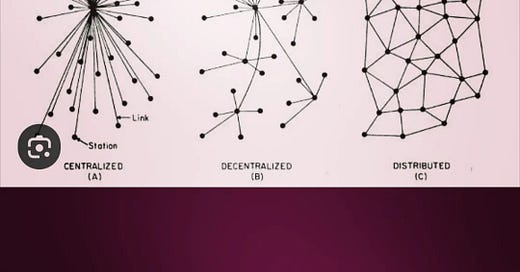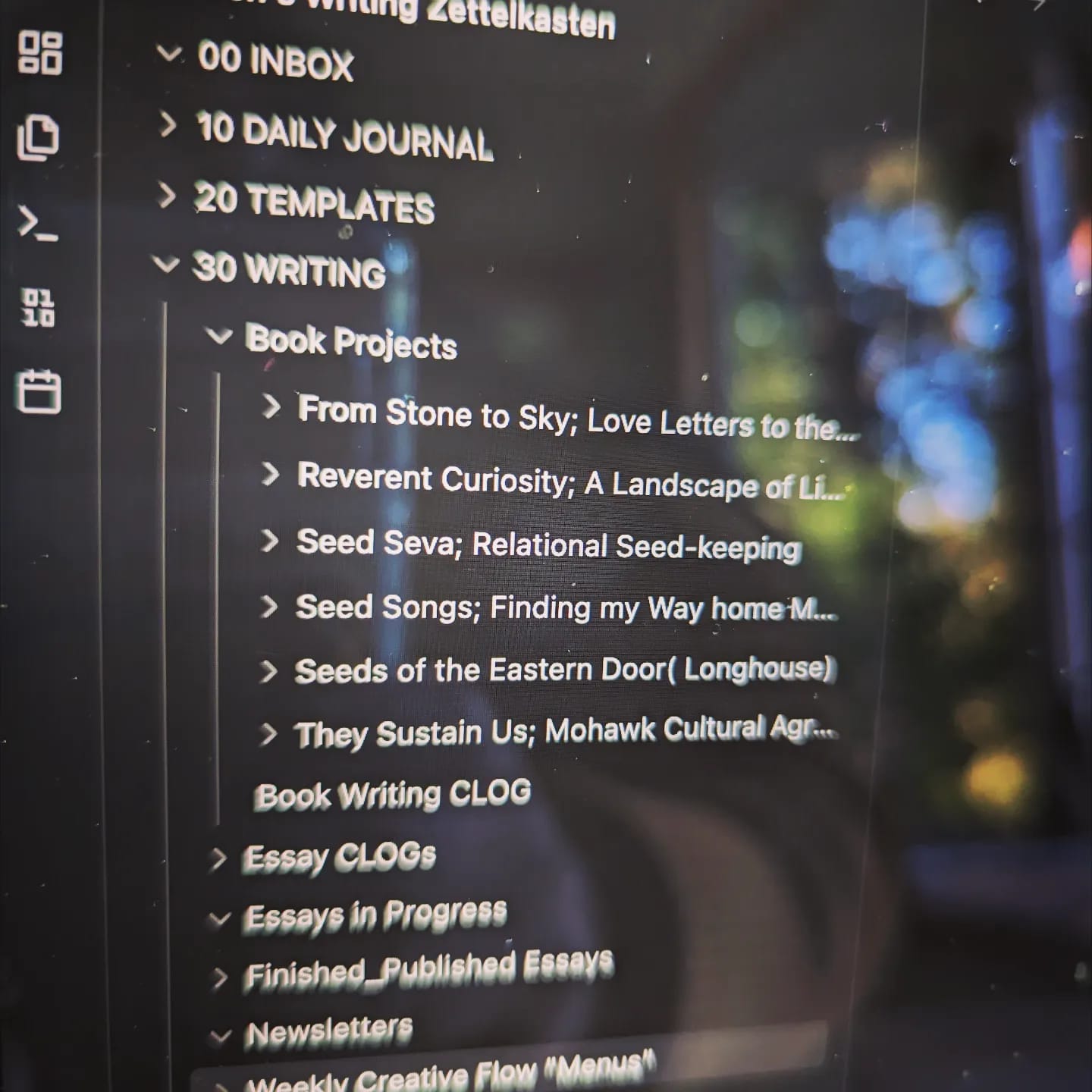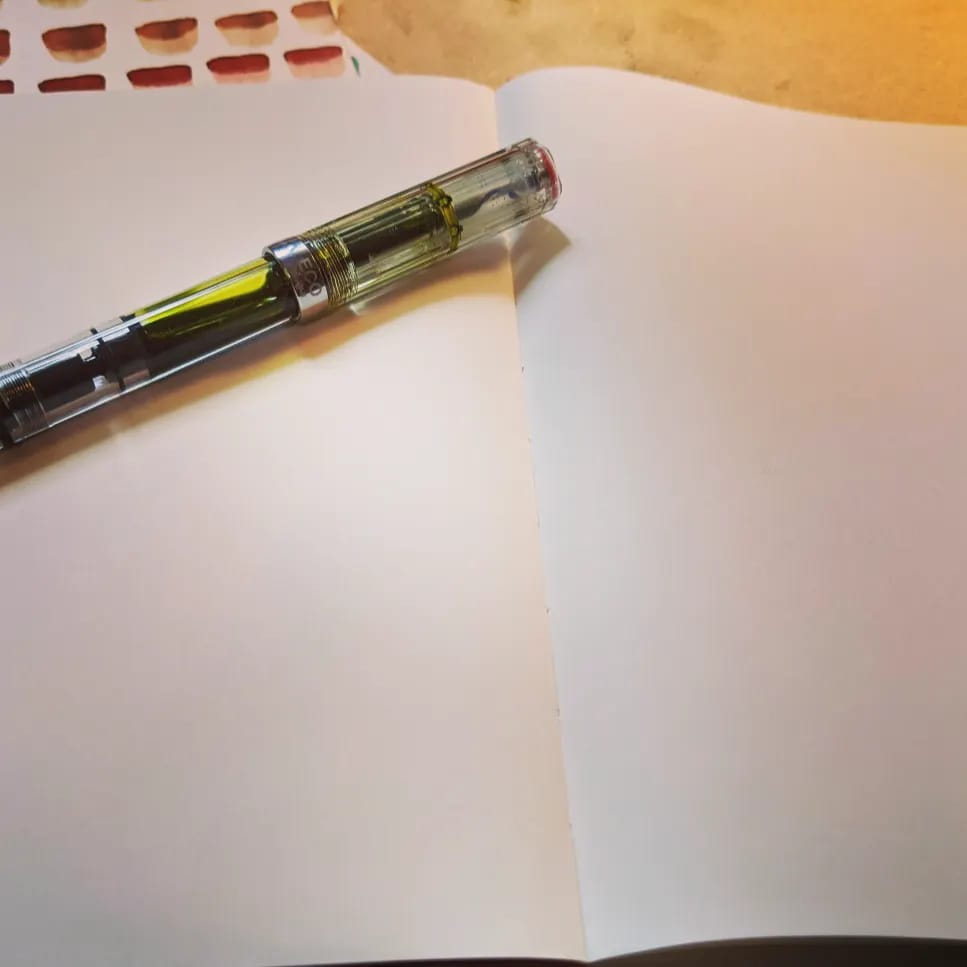Cultivating a Personal "Idea Culture"
Creating Linked and Distributed Notemaking to enhance relational memory and thinking
Thinking a lot about how I currently take in information, ideas, and media and continue to increase my capacity for relational thought patterns. Undoing the linear and siloed constructions that Western colonial schools indoctrinate us in, and continuing to work to create a more mycelial web of relational knowledge tending. The US education system and centralized media make it super easy for folks to get super stuck into rigid, centralized, binary, and siloed flows of information that impact the way they make decisions, act, and move through life.
I have been learning in a beautiful online community of practice on creating linked relational knowledge and memory landscapes ( analog or digital) that help catalyze our creative writing process.
I like to think of my knowledge/memory landscape as an "living idea culture" just like the bubbling sourdough culture that I feed regularly on my countertop. Becoming less of a passive consumer of media and content, I seek out high-quality "food for thought" from trusted writers, thinkers, artists, etc and make time in my weekly rhythms to read, note-make, sensemake, and digest what I am choosing to consume.
I try and break free of the algorithms that can keep us in weird echo chambers of confirmation bias loops, and genuinely try and expand my scope of learning from a diversity of perspectives. The key is to take the time to really be in conversation with the authors and creatives who I listen to and read, and add my thoughts and ideas to them. In this way, I feed my "knowledge and idea culture" with high-quality predigested information that helps inform my writing, creative process, life and work in general. Note-making and sensemaking is where I engage the ideas that are coming up in my day-to-day life or the information I am coming across in books, podcasts, videos, and conversations, and not only taking the time to jot down what is interesting to me, but I also add my own thoughts as a response to this idea/info and also take the time to strengthen my relational memory field by linking notes together that have similar threads.
Relational memory is the ability to remember arbitrary or indirect associations between objects, places, people or events. This is the basis of how indigenous memory operates, it is based on relationality.
I have grown so much in the last few months in engaging in deep meaningful conversations in the many ways that me and my friend circle are digging deep to learn more about what is happening with the current escalation of violence in the Middle East. If we are to grow as a species beyond the violence of empire, we need to listen and learn alongside each other, and teach our children how to engage in collective and relational critical thinking which is the best antidote to the poison of propaganda.
In an article penned by Emily Willingham on neuro-ergonomics, she shares: "The concept of a collective mind is that, in a social species such as ours, the default isn’t a single brilliant mind doing all the work but instead a collective of them, shaped by evolution to operate together. It’s not a new idea. Steven Sloman is co-author of The Knowledge Illusion: Why We Never Think Alone (2017). He and two other co-authors recently proposed that, in using our individual brains, we rely on components from other brains in what they call ‘a community of knowledge’. One idea they develop is the interdependence we have on each other for problem-solving, decision-making, and even memory. This dependence means that we often outsource our information, relying on our connections with others to obtain information we need, rather than holding it ourselves. As they note, we constantly connect with other brains, not only those in our immediate vicinity but across time and space (as you and I are connecting now), accessing information from other minds and weaving it into our own repertoires. We can even take ideas from people who died thousands of years ago, as long as they left an ancestral record. When we interweave one another’s gathered knowledge strings into a mutually recognizable social pattern, we have culture. Culture can be both a boon and a burden. Cecilia Heyes, senior research fellow in theoretical life sciences at All Souls College, University of Oxford, is the author of Cognitive Gadgets: The Cultural Evolution of Thinking (2018). In an essay for Aeon, she argued that humans aren’t born with an innate instinct for certain behaviors we view as social, but we do come equipped with the tools, such as memory, attention, and recognizing patterns, to learn these practices. Evolution provides the basic toolkit, but culture leverages those tools socially to shape the skills, with each culture doing so in a specific, unique way. "
When we engage in activities together – whether walking, cooking or lunching – we also engage each other’s minds and, almost inevitably, we will share what’s in them. With this reciprocity, we share problems, dreams and feelings of happiness, and in a healthy version of such sharing, get support or insight or heartfelt happiness in return. In this human-human system, we shed some of our cognitive burden, inviting other brains to engage with the problem-solving, bring useful experience to understanding it, or just share the emotion, diminishing the burden by half.
In my knowledge/idea culture that I hope to share more about in the future, I try and make it as "distributed" as possible, meaning I try and practice making unexpected links between ideas and information.
A lot of people only get their source of information from a few sources, and in that way, their critical relational minds are not very dynamic, and can lead to a dangerous narrowing of minds and perspectives, which is the onramp to a fascist way of being. This centralized way of thinking is what empire preys upon.
Even "decentralized" ways of gaining information and storing memory can be limiting, because thoughts, ideas, and understanding of certain historical events can be isolated and siloed, and we don't see the overlapping cause and effect or interdependent phenomena when we learn in these closed-loop systems. - My idea/thought culture of memory always has a bit of playful dysfunction. Getting lost in my notes to help seed new connections and ideas.
Kind of like when you go into a library to look for a specific book and then you end up finding other books in that same section that are interesting to you, this is how my distributed mycelia idea culture is set up, and it has been such a beautiful memory space to feed and tend to in service of being one memory keeper and storyteller in my bloodlines.
I write to metabolize and digest my life's experiences, I note-make and chronicle and bear witness because that is part of engaging with a collective memory body, one that hopefully will help us sprout the next layer of culture from the compost pile of the failures of empire.
As my elder Martin says: "What is difficult and worthy of praise is to be able to bring alive again a “real” memory instead of the poisoned memory of the recent past: the memory like that of a seed who can again grow itself into a plant of marvelous character and more imaginative notions, even in bad conditions. To further immerse the mechanically specialized minds of dogs and soldiers into a trance against which they are undefended by calling up something ancient in them for which neither their manuals nor their people’s last millennia of experience had any calibration was no proud feat; a real accomplishment might have been to find a way for those minds to begin serving the remembrance of their weeping hearts long enough for them to long for a real existence at home naturally on an indigenous earth."
I want to create a series here where I explore the practices and logistics of maintaining and feeding my personal “idea culture”. Let me know if you have any questions around this concept.







Thank you. I keep discovering new ways that I need to decolonize my brain, and other ways that my most natural way of processing has always resisted the colonization. You’ve given me more food for thought in this unraveling.
Much of this resonates with me as I am shifting my individual creative practices towards amplifying the collaborative/symbiotic elements with the individuals that I am blessed to work with currently.
I am starting to understand reciprocity as less of an exchange BETWEEN and more of a lens to see WITH those who I co-create.
My own 'idea culture' has absolutely been formed in isolation and detachment from others and reading this today I feel assured in moving towards a different state of ideation. Thank you!